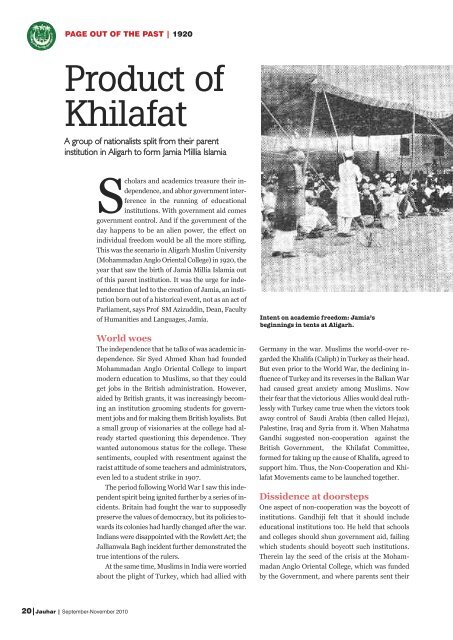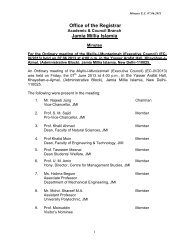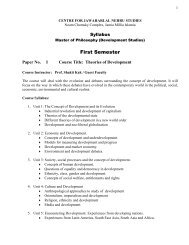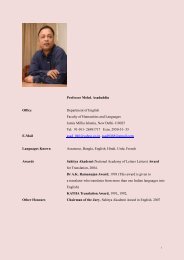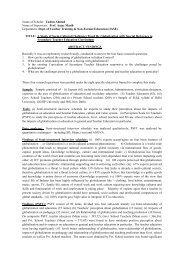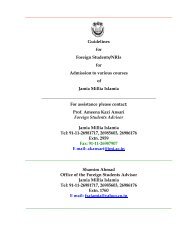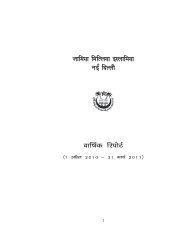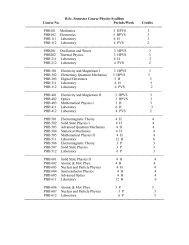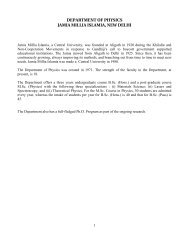Jauhar | September-November 2010 - Jamia Millia Islamia
Jauhar | September-November 2010 - Jamia Millia Islamia
Jauhar | September-November 2010 - Jamia Millia Islamia
You also want an ePaper? Increase the reach of your titles
YUMPU automatically turns print PDFs into web optimized ePapers that Google loves.
PAGE OUT OF THE PAST | 1920<br />
Product of<br />
Khilafat<br />
A group of nationalists split from their parent<br />
institution in Aligarh to form <strong>Jamia</strong> <strong>Millia</strong> <strong>Islamia</strong><br />
20|<strong>Jauhar</strong> | <strong>September</strong>-<strong>November</strong> <strong>2010</strong><br />
Scholars and academics treasure their independence,<br />
and abhor government interference<br />
in the running of educational<br />
institutions. With government aid comes<br />
government control. And if the government of the<br />
day happens to be an alien power, the effect on<br />
individual freedom would be all the more stifling.<br />
This was the scenario in Aligarh Muslim University<br />
(Mohammadan Anglo Oriental College) in 1920, the<br />
year that saw the birth of <strong>Jamia</strong> <strong>Millia</strong> <strong>Islamia</strong> out<br />
of this parent institution. It was the urge for independence<br />
that led to the creation of <strong>Jamia</strong>, an institution<br />
born out of a historical event, not as an act of<br />
Parliament, says Prof SM Azizuddin, Dean, Faculty<br />
of Humanities and Languages, <strong>Jamia</strong>.<br />
World woes<br />
The independence that he talks of was academic independence.<br />
Sir Syed Ahmed Khan had founded<br />
Mohammadan Anglo Oriental College to impart<br />
modern education to Muslims, so that they could<br />
get jobs in the British administration. However,<br />
aided by British grants, it was increasingly becoming<br />
an institution grooming students for government<br />
jobs and for making them British loyalists. But<br />
a small group of visionaries at the college had already<br />
started questioning this dependence. They<br />
wanted autonomous status for the college. These<br />
sentiments, coupled with resentment against the<br />
racist attitude of some teachers and administrators,<br />
even led to a student strike in 1907.<br />
The period following World War I saw this independent<br />
spirit being ignited further by a series of incidents.<br />
Britain had fought the war to supposedly<br />
preserve the values of democracy, but its policies towards<br />
its colonies had hardly changed after the war.<br />
Indians were disappointed with the Rowlett Act; the<br />
Jallianwala Bagh incident further demonstrated the<br />
true intentions of the rulers.<br />
At the same time, Muslims in India were worried<br />
about the plight of Turkey, which had allied with<br />
Intent on academic freedom: <strong>Jamia</strong>’s<br />
beginnings in tents at Aligarh.<br />
Germany in the war. Muslims the world-over regarded<br />
the Khalifa (Caliph) in Turkey as their head.<br />
But even prior to the World War, the declining influence<br />
of Turkey and its reverses in the Balkan War<br />
had caused great anxiety among Muslims. Now<br />
their fear that the victorious Allies would deal ruthlessly<br />
with Turkey came true when the victors took<br />
away control of Saudi Arabia (then called Hejaz),<br />
Palestine, Iraq and Syria from it. When Mahatma<br />
Gandhi suggested non-cooperation against the<br />
British Government, the Khilafat Committee,<br />
formed for taking up the cause of Khalifa, agreed to<br />
support him. Thus, the Non-Cooperation and Khilafat<br />
Movements came to be launched together.<br />
Dissidence at doorsteps<br />
One aspect of non-cooperation was the boycott of<br />
institutions. Gandhiji felt that it should include<br />
educational institutions too. He held that schools<br />
and colleges should shun government aid, failing<br />
which students should boycott such institutions.<br />
Therein lay the seed of the crisis at the Mohammadan<br />
Anglo Oriental College, which was funded<br />
by the Government, and where parents sent their


